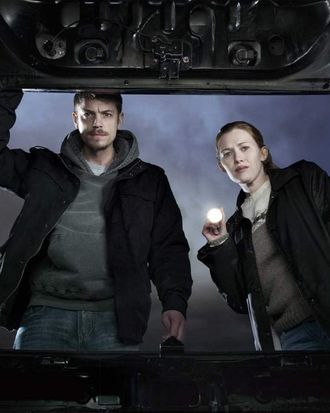

After a season’s worth of red herrings and false suspects, The Killing’s Detectives Linden and Holder are still driving around in the rain, searching for leads in the Rosie Larsen Murder case. With only two episodes left and no suspect to speak of, it doesn’t feel like the most successful investigation. Of course, failure is built into the show’s structure: A “thoughtful,” drawn-out procedural is still a procedural, and obviously we can’t learn the murderer’s identity until the very end. But many of our recap commenters (as well as others) have noted that as the days tick by, Linden and Holder seem to be making a fair number of mistakes that transcend the usual procedural red herrings. (Videogum’s Gabe Delahaye went so far as to name Linden “the worst cop on Earth”; our own Andy Greenwald has questioned her decision-making and cell-phone practices at length.) But we’re only an authority on TV cops; to truly judge them, we need an authority on real cops, so we asked two real detectives — Mark Jamieson, Seattle PD, and Jay Salpeter, former NYPD — to weigh in on Linden and Holder.
We first spoke to Detective Mark Jamieson of the Seattle Police Department, who consulted on The Killing early in the show’s development. He said that most of the producers’ questions focused on police procedure.
You’re watching the show: Do you feel like the way the detectives have handled themselves is generally plausible?
It’s interesting — and I’m probably looking at it with a much more critical eye — I think it’s a great show. That being said, it is Hollywood. In the real world, police procedures are pretty boring, and it doesn’t really make for good television.
How do you feel about the relationship between the two detectives? Is that realistic?
No, you don’t have somebody transfer in from County to work Homicide one day. It just doesn’t work that way. And on her last day, she’s ready to retire and then she gets this case and her Lieutenant won’t let her go.
That’s not how it would go?
No. But it makes for a good story.
I think they’re on Day 10 right now? In real life, are they ahead or behind, in terms of the investigation?
I would say, ten days, and it hasn’t been solved yet — that’s not outside the norm.
Can I ask you a little about the teacher? When his name was leaked as a suspect, did they handle that appropriately?
The way the story was going, they certainly had a reason to look at the teacher. They probably could have been a little more discreet.
They also seem to be very communicative with the victim’s family. Is that standard?
Detectives will, as much as they can, [while] still protecting the integrity of the investigation … they want to keep the families updated and involved. There’s nothing worse than a family having to see something on the news, read it in the paper.
Like the photos that were released.
That’s the other thing — how did her son get access to that? She would never have that stuff at home, e-mail her file or whatever — that’s Hollywood.
What about when she told the mother that they planned to make the arrest?
Yeah, and that’s a classic trap that sometimes people fall into. You empathize with the victim, you want to say something to make them feel better, and you promise that “We’re gonna solve this, we’re gonna get the person responsible.” And you know what? Sometimes you can’t.
But that does happen?
It does. You know, we’re human? Sometimes people say things and you promise something through no fault of your own that you can’t deliver.
Can I ask you about the FBI raid, and busting into the van — would someone do that?
Probably not. You would be in a lot of trouble, and you know what, there would probably be a little better coordination at the front end. They would probably know that FBI was watching that place.
So just wandering up to a random address is not normal?
Yeah. And again, they would probably keep their supervisor in the loop?
A number of viewers have noticed that Linden refuses to put her phone on silent.
Oh, yeah!
Is there some sort of police code that you have to keep your phone on or something?
I think it’s just for dramatic purposes.
We also talked to Jay Salpeter, retired NYPD directive. He had only watched the last episode, which digressed from the main investigation to focus on Linden’s search for her missing son. But her behavior in that situation really miffed him.
What do you think about the episode?
You’re paid by the city to work at a police department — you cannot just go around doing personal business. That’s a very important point. These people are just out there doing whatever with her son, and that’s not what you’re being paid for. You want to look for your son, you take the day. You don’t just go running around with a department car. And the hours are totally ridiculous — I mean, a detective works an eight- or nine-hour day. Depending on the incident, if a new incident comes in, they can give him overtime. But these guys are running around — is it night, is it day?
So you weren’t impressed with them, generally.
I had no sense of camaraderie. You know, detectives work with each other. It just seems like she is a lunatic, and there are no other groups there. I don’t see any help, any talking over your case with other detectives. I got no sense of teamwork. And then, the biggest mistake that I saw, the kid that died? The one they found dead [that she feared was her son]. They put the name over the radio. No. 1: All the press monitor these radios. That’s the last thing that the police department wants to hear — that the family learns about stuff in the newspaper.
That happened, actually, in an earlier episode. Some photos of the crime scene were leaked, and the victim’s family had to see them on the local news.
That’s a very big mistake. I thought it was ridiculous. They look like they’re two renegades doing their own work. If it’s Seattle, it’s a big city, there’s rules, there’s guidelines, there’s supervisors. It’s totally not believable that you’re gonna spend a whole shift on personal work.
Can I ask you about a few other incidents? At one point, the female detective also told the victim’s family about a planned arrest. Does that happen?
I don’t tell you until I have a body in handcuffs. It’s a very emotional thing to tell the family … To say an arrest is imminent, it happens, but it’s not smart.
There was an incident where the male detective smoked a fake weed substance to get info from a source. What do you think about that?
Trickery is allowed. As long as it wasn’t weed. You’re allowed to trick people — if that made his guys more amenable, then yeah. If he used actual drugs, then no. It’s like a prostitute: If you actually sleep with the prostitute, then you’re in trouble.




